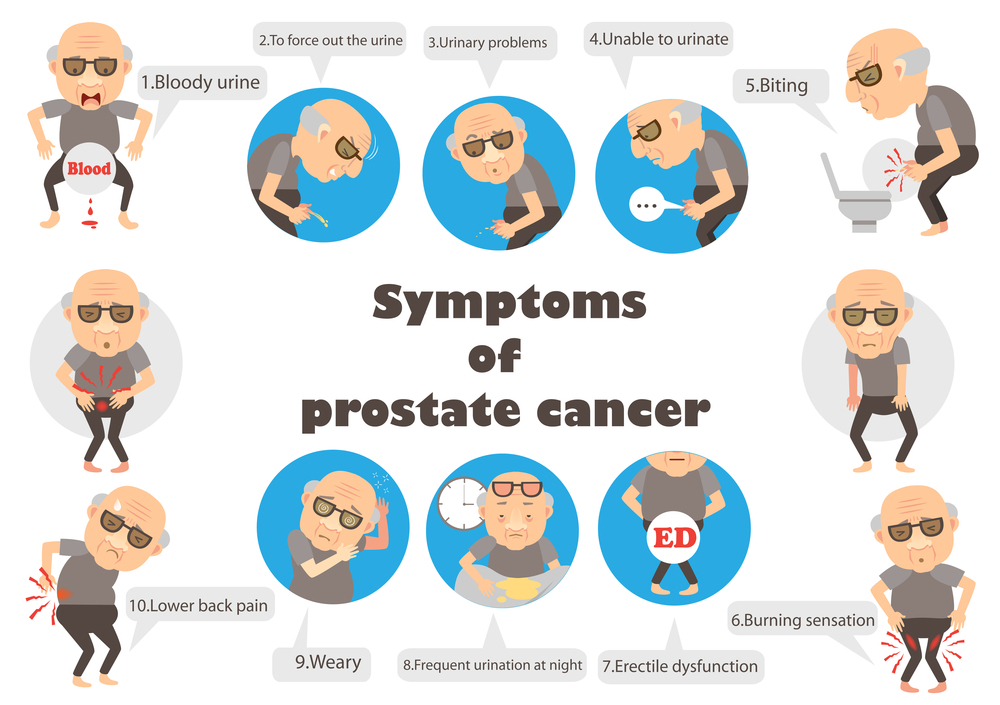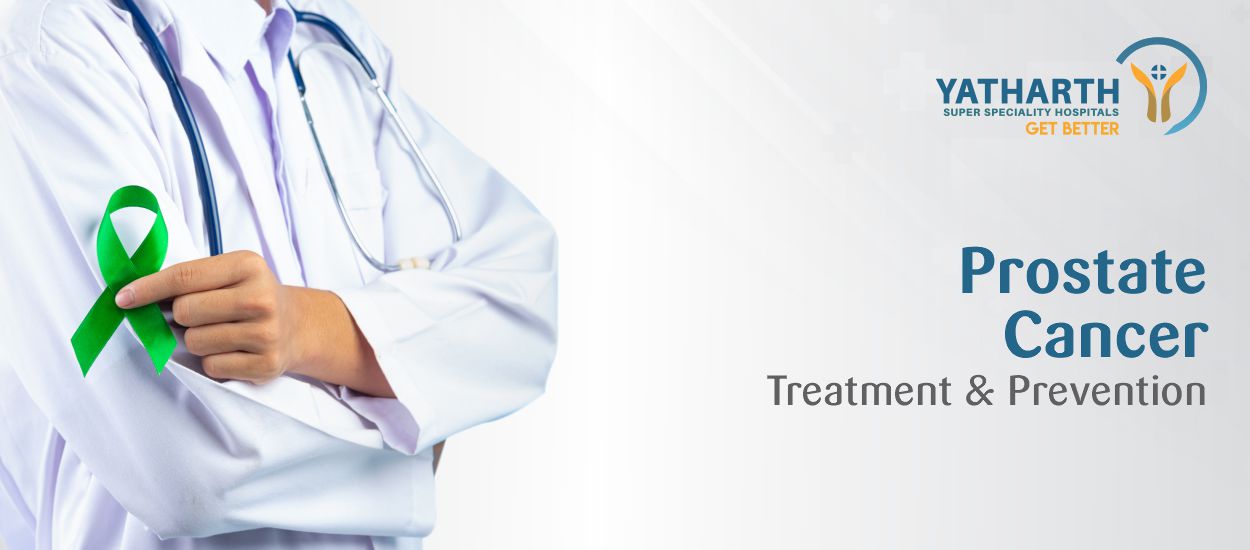Prostate Cancer: Diagnosis, Treatment, and Prevention
Prostate cancer, also known as adenocarcinomas, is one of the most prevalent types of cancer that affects men, particularly those over the age of 50. While it can be a serious condition, it's also highly treatable by a urologist in Noida from the best urologist hospital in Delhi NCR when caught early. In this blog, we'll explore the various aspects of prostate cancer, including diagnosis, treatment, and prevention.
Understanding Prostate Cancer: What It Is, Who's at Risk, and Symptoms
Men's prostates are glands that are situated below the bladder. It's responsible for producing fluid that nourishes and protects sperm. Prostate cancer emerges when cells in the prostate gland start to grow out of control.
Some men may be at higher risk for prostate cancer than others. Risk factors include age, family history, and race. Men aged 50 or older are more likely to develop prostate cancer, and those with a family history of the disease are also at increased risk..
Symptoms of prostate cancer can vary but may include frequent urination (especially at night), difficulty in urinating, blood in the semen or urine, pain in the hips, back, or chest, and erectile dysfunction. It's important to note, however, that many men with prostate cancer experience no symptoms at all.
Screening for Prostate Cancer: When and How to Get Tested
Screening for prostate cancer involves testing for the disease before symptoms appear. There are two common tests used for prostate cancer screening: the prostate-specific antigen (PSA) test and the digital rectal exam (DRE).
The PSA test quantifies the PSA concentration in a man's blood. High levels of PSA, a protein generated by the prostate gland, may indicate prostate cancer. The PSA test, however, is not always reliable because elevated levels can also point to other diseases, like an enlarged prostate.
In the DRE, a physician feels the rectum with a finger while wearing gloves and lubricant to check for lumps or other abnormalities in the prostate gland. Despite its limitations, the DRE can occasionally pick up prostate cancer that the PSA test missed.
Experts recommend that men discuss the risks and benefits of prostate cancer screening in Noida with their doctor starting at age 50 (or earlier if they have risk factors).
Prostate Cancer Diagnosis: What to Expect During Tests and Procedures
If a man's PSA test or DRE suggests the possibility of prostate cancer, further tests will be needed to confirm the diagnosis. These may include a prostate biopsy, in which a small sample of prostate tissue is removed and examined under a microscope.
During a prostate biopsy, a doctor will use a thin needle to take several small samples of prostate tissue. The procedure may be uncomfortable, but it's usually not painful. In most cases, a doctor may also use an ultrasound to guide the biopsy needle to the correct location.
Treatment Options for Prostate Cancer: Surgery, Radiation, Hormone Therapy, and More
Prostate Cancer treatment depends on the stage of cancer, as well as the patient's age and overall health. Common treatments include:
Surgery: During a prostatectomy, a urologist in Noida Extension will remove the prostate gland and some surrounding tissue. Men with early-stage prostate cancer that hasn't progressed past the prostate gland are often advised to do this.
Holmium laser prostate (HoLEP) surgery: A less invasive treatment for an enlarged prostate is holmium laser prostate surgery. Also called holmium laser enucleation of the prostate (HoLEP), the procedure uses a laser to remove tissue that is blocking urine flow through the prostate. The prostate tissue is subsequently sliced into easily detachable parts using a separate instrument. HoLEP is similar to open prostate surgery but requires no incisions. HoLEP eliminates the whole area of the prostate that can impede urine flow. It could be used to treat a severely enlarged prostate.
Hormone therapy: To do this, hormones that promote the growth of prostate cancer cells must be blocked or eliminated. For advanced prostate cancer, hormone therapy is frequently used in conjunction with other therapies.
Chemotherapy: This is the use of medications to eradicate cancer cells throughout the body. Advanced prostate cancer that has spread to other body parts is often treated with chemotherapy.
Other treatment options may include cryotherapy (freezing the prostate gland) or high-intensity focused ultrasound (destroying cancer cells with high-frequency sound waves).
It's important to assess the advantages and disadvantages of every treatment option with your urologist in Noida.
Managing Prostate Cancer Side Effects: Coping Strategies and Support
Managing the side effects of prostate cancer treatment in Noida is an important part of the process. Depending on the treatment used, men may experience side effects such as fatigue, nausea, urinary problems, sexual dysfunction, and more.
It's important to consult a urologist in Noida about ways to manage these side effects. For example, some medications can help with urinary incontinence or erectile dysfunction. In addition, there are support groups and resources available to help men cope with the emotional and psychological effects of prostate cancer.
Prostate Cancer Prevention: Lifestyle Changes and Early Detection
While there is no sure way to prevent prostate cancer, there are steps men can take to reduce their risk. These include:
♦ Eating a healthy diet that's low in fat and high in vegetables, fruits, and whole grains
♦ Regular exercise
♦ Maintaining a healthy weight
♦ Avoiding smoking
Early detection is also key to treating prostate cancer successfully. Men should talk with their doctors about prostate cancer screening in Noida and consider getting tested starting at age 50 (or earlier if they have risk factors).
It's imperative to get the best care if you or a loved one has been diagnosed with prostate cancer. In Noida, the best Prostate Cancer Hospital in Noida and Prostate cancer specialists in Noida are available to provide treatment and support.
The Best Prostate Cancer Hospital in Delhi NCR helps in diagnosing and treating prostate cancer. The Best urologist hospital in greater Noida offers a wide range of treatment options, including surgery, radiation therapy, and hormone therapy, and has a team of experienced doctors and support staff who are dedicated to providing the best possible care to patients.
Similarly, if you're looking for Prostate Cancer Treatment in Noida, there are many qualified doctors and hospitals available to provide care.
Prostate cancer is serious but a treatable condition. Through early detection and the right treatment, many men with prostate cancer can live long, healthy lives. By taking steps to reduce your risk of prostate cancer and staying vigilant about your health, you can ensure that you receive the best possible care to combat prostate cancer.


